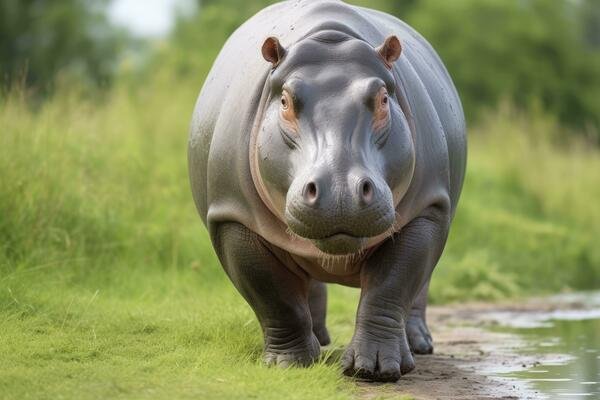
Hippos are more than just cute and cuddly in pictures; they’re essential players in their ecosystems. You might be wondering what makes them so special. Well, let’s dive into the fascinating roles hippos play in their surroundings, how they interact with other species, and why their presence—or absence—can ripple through entire ecosystems.
The Habitat of Hippos
Hippos primarily dwell in sub-Saharan Africa, usually found in rivers, lakes, and mangrove swamps. They’re large, semi-aquatic mammals that spend much of their day submerged in water to keep cool. However, they must come ashore to graze on grass at night. Their weight, which can reach up to 4,000 pounds, often creates wallows that provide habitats for various smaller organisms, from fish to insects.
During the dry season, hippos tend to congregate in smaller bodies of water. This concentration impacts the local environment—their hefty bodies can significantly affect the landscape. When hippos move through their habitat, they create channels that allow water to flow more freely. These channels help other animals access fresh water, enhancing biodiversity.
Hippos as Ecosystem Engineers
Hippos are often dubbed “ecosystem engineers,” and for good reason. Just like how a beaver creates a dam, hippos mold their environment in ways that benefit other species. When they graze, they not only consume grass but also trample down vegetation, preventing it from becoming overgrown and allowing sunlight to hit the soil.
This helps maintain a balanced ecosystem. When grasslands are kept in check, it allows other plants to thrive, creating a diverse habitat. Birds and small mammals benefit from the open spaces that hippos create, leading to a vibrant community of wildlife. If hippo populations decline, the vegetation can become overgrown, choking out other species and disrupting the entire ecosystem.
Water Quality and Nutrient Cycling
You might not think about how animals affect water quality, but hippos play a crucial role in this area too. Their droppings are rich in nutrients, especially nitrogen and phosphorus, which can enhance the growth of aquatic plants. This nutrient input is vital for maintaining healthy waterways since it supports food chains.
As hippos feed on vegetation, they also excrete waste that contains seeds from the plants they’ve consumed. This process helps to spread these seeds to new locations, facilitating plant growth and increasing biodiversity. Essentially, hippos are natural gardeners, ensuring that their ecosystems stay healthy and productive.
Interactions With Other Species
Hippos are not solitary creatures; they live in groups called pods, which typically consist of a few dozen individuals. This social structure impacts their ecosystem significantly. They often share their environment with other animals, including birds, fish, and reptiles.
For example, birds like the oxpecker benefit from living near hippos by feeding on ticks and parasites found on their skin. In turn, hippos receive a cleaning service, which keeps them healthier. This mutualistic relationship highlights how interconnected life can be in an ecosystem. When hippo populations decline, it can disrupt these relationships, affecting not just hippos but also the species that rely on them.
The Role of Hippos in Predator-Prey Dynamics
Although hippos might seem too large to have natural predators, they do play a role in predator-prey dynamics. By maintaining the balance of vegetation, they influence the populations of herbivores, like antelopes and zebras, which depend on the same grasslands. These grazers in turn are prey for larger predators, like lions and crocodiles.
When hippo numbers dwindle, it can lead to overpopulation of certain herbivore species. This overpopulation can cause overgrazing, leading to habitat degradation and a decline in food sources, which impacts predator populations as well. Consequently, every hippo counts—not just for themselves, but for the entire food web.
Conservation and the Future of Hippos
Despite their significant ecological role, hippos face numerous threats, including habitat loss, poaching, and climate change. Understanding these challenges is essential for their conservation. Without efforts to protect them, we risk losing not just this fascinating species but also the delicate balance of their ecosystems.
Conservationists are working tirelessly to implement protective measures, such as creating reserves and promoting sustainable practices among local communities. Education plays a key role in these efforts, as raising awareness about the importance of hippos can lead to better support for conservation initiatives.
Why Hippos Matter to Us All
You might be wondering how the decline of a single species like the hippo could affect you. Well, when ecosystems become imbalanced, we feel the impact, too. Healthy ecosystems support agriculture, clean water, and even tourism. By ensuring hippos thrive, we help maintain the overall health of their environments, which ultimately supports our own well-being.
So next time you see a picture of a hippo or hear something about them, remember their crucial role in the ecosystem. They might look like giant, round animals lounging in the water, but underneath that placid exterior lies a powerful force for environmental health.
By protecting hippos, we’re not just saving a species; we’re ensuring a healthier planet for all living beings, including ourselves. In this interconnected web of life, every thread counts, and the humble hippo is a key part of that tapestry.
